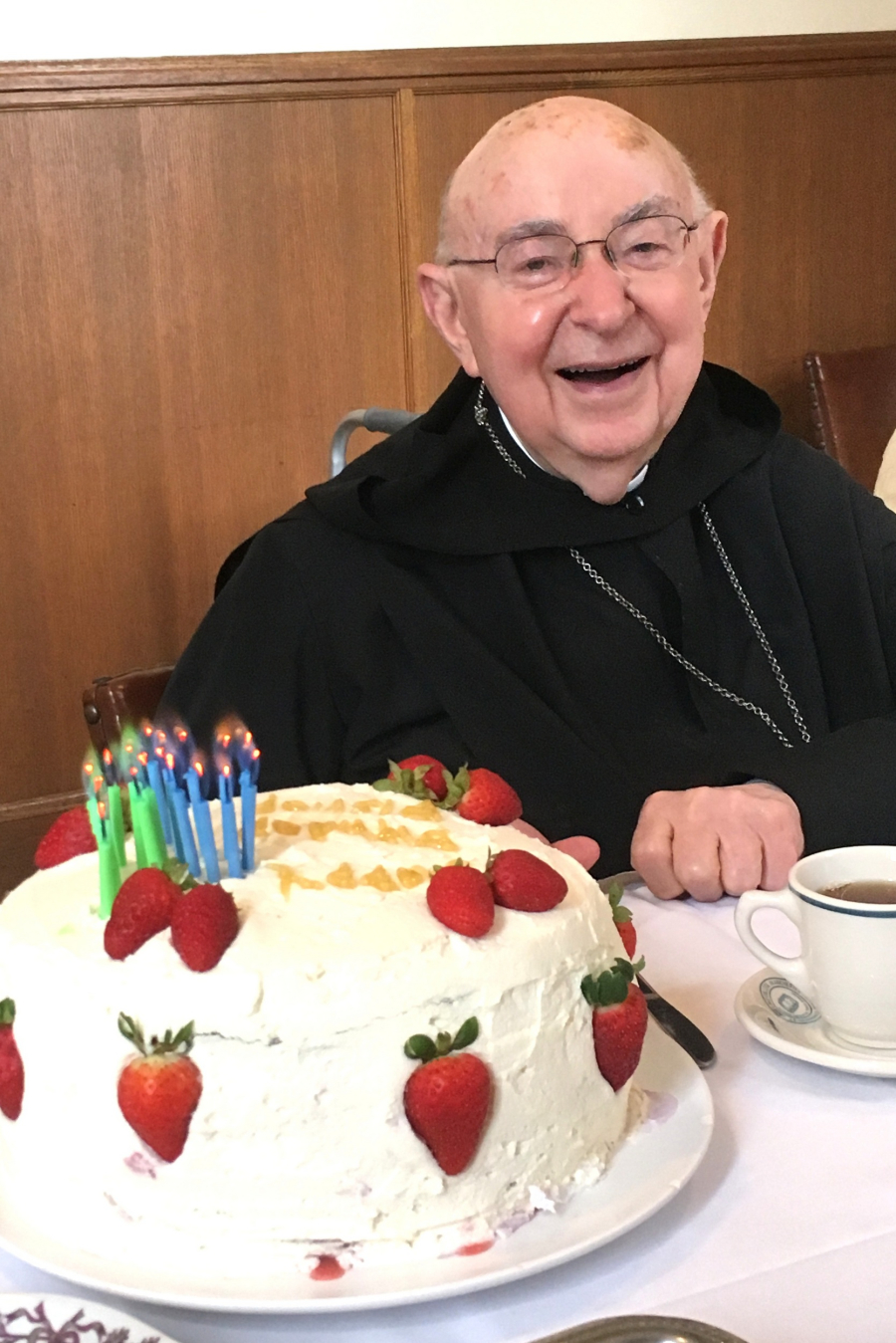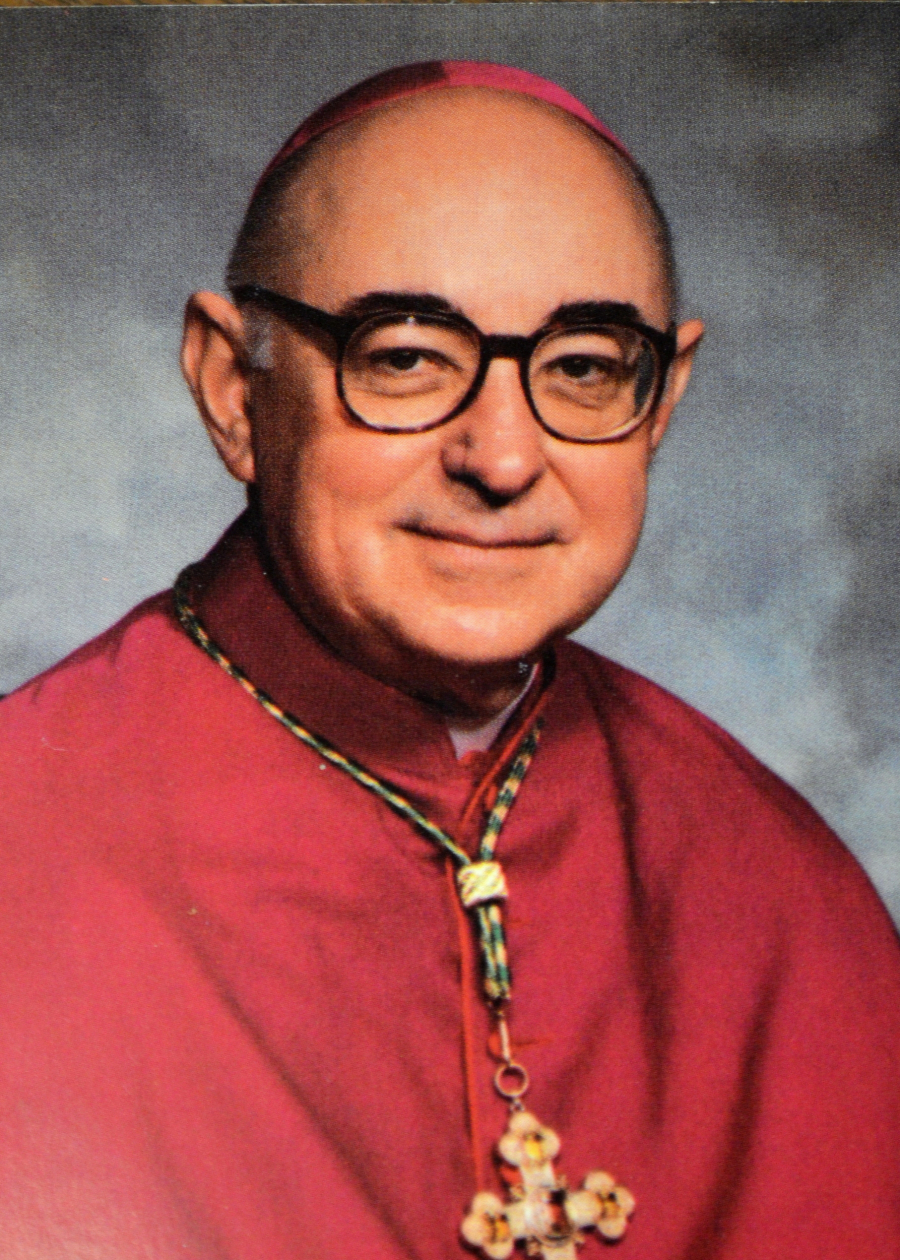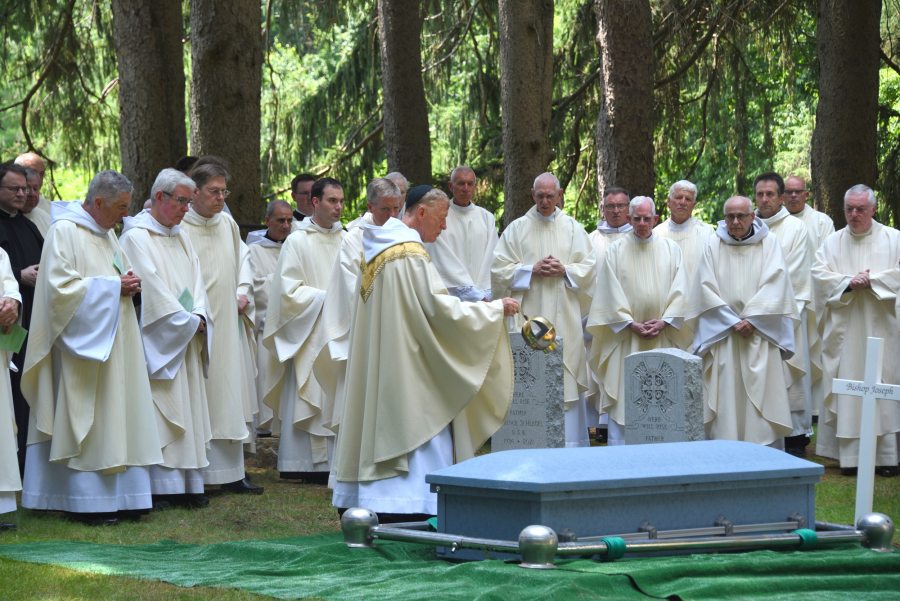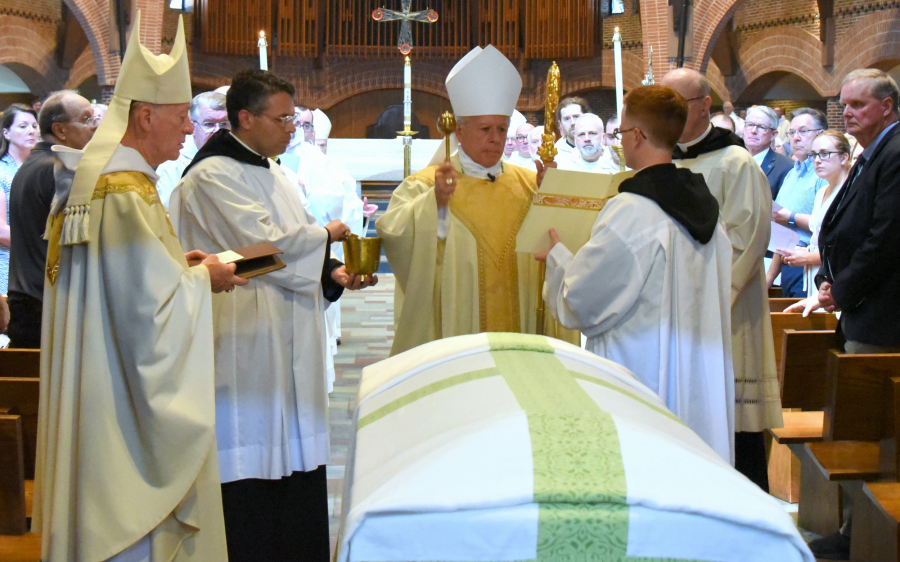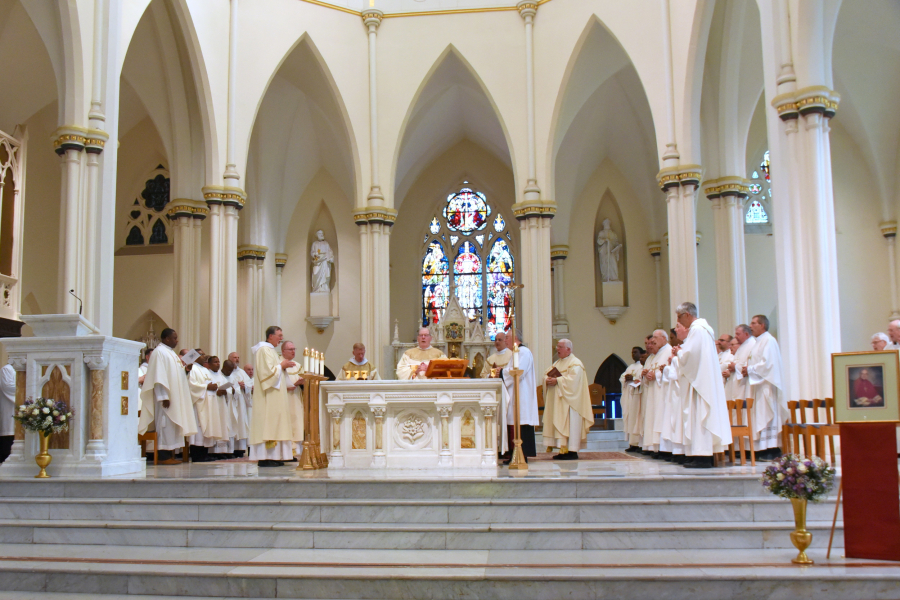Remembering a joyful man of prayer
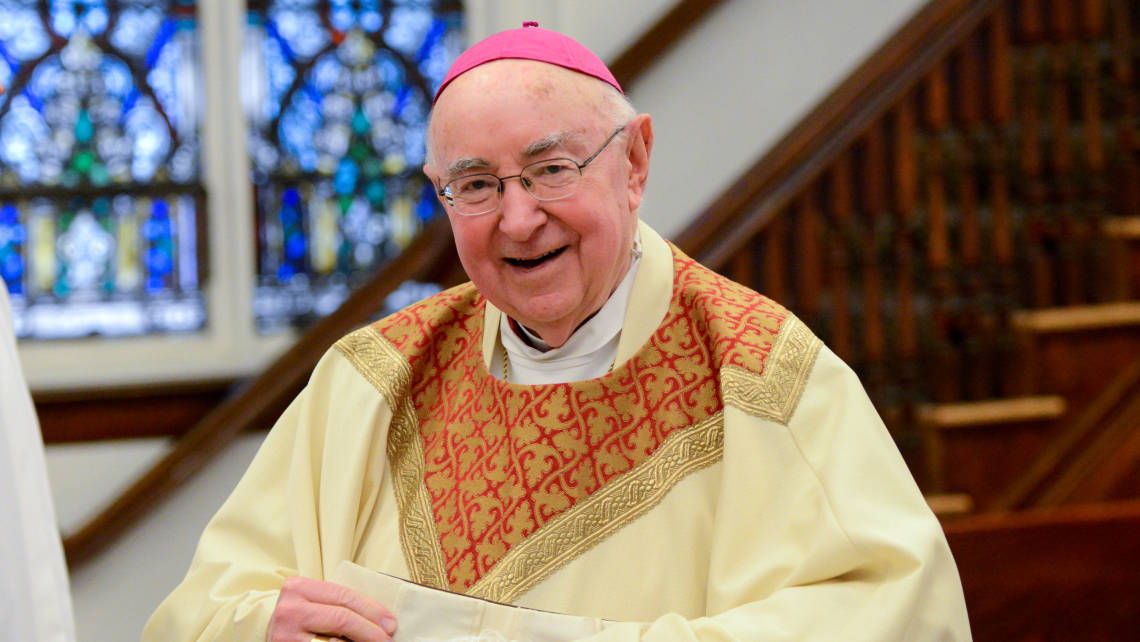
He was a monk, a priest, a teacher, an abbot, and a bishop, but those who knew Bishop Joseph Gerry, OSB, remember him not for the positions he held but for the way he lived his faith, describing him as a kind and joyful man who dedicated his life to building up the kingdom of God.
“He certainly was an example of somebody who was always trying to do God’s will,” says Msgr. Paul Stefanko, vicar for priests for the Diocese of Portland. “He led with great kindness.”
“Bishop Joseph was a man of deep prayer. He respected and he found the good in everybody, everybody,” says Sister Rita-Mae Bissonnette, RSR, chancellor.
“He was, above all, a man of faith, a good and gracious man, full of warmth, with a keen sense to select which choice was correct, and appropriate, and fair,” says Abbot Mark Cooper, Bishop Joseph’s nephew and the fifth abbot of Saint Anselm Abbey in Manchester, New Hampshire. “If Joseph had a salient characteristic, it was his awareness of the immediate presence of Christ in his life.”
Bishop Joseph, the 10th bishop of Portland, died on July 2, 2023, the 75th anniversary of his profession as a member of the Benedictine Order. He was 94 years old.
Bishop Joseph was a native Mainer, born and raised in Millinocket where some of his family members still live. He was baptized John Gregory, named for the fifth bishop of Portland, Bishop John Gregory Murray. As he told the story, letters from Bishop Murray used to be read in church, and his mother thought the name was beautiful.
Bishop Joseph said the roots of his vocation were planted in those early years. Although he couldn’t recall his parents ever speaking specifically about the priesthood, he said the importance of the Church “was gently woven into our outlook on life.”
As he told The Church World in 1989, “Thus, from a very young age, I prayed for the grace to come to know what the Lord desired, for somehow, I never doubted that His desire for me was for my well-being and happiness.”
In 1945, he attended Saint Anselm College in Manchester, pondering three possible vocations — doctor, teacher, or priest. He discerned it was the latter to which he was called, although education remained important to him throughout his life.
“He was always a teacher and a student in many ways. He was widely read, and he shared those readings in talking with people, and he would give them books to read. That was all part of his teaching office,” says Msgr. Stefanko, who was appointed judicial vicar by Bishop Joseph.
From his first months at the college, Bishop Joseph said he felt called to the Benedictine way of life.
“I saw a group of men who seemed to enjoy one another and the work they were doing and seemed to be very much in love with God,” he recalled.
At age 18, he entered the Benedictine novitiate, professing first vows as a member of Saint Anselm Abbey on July 2, 1948. Upon entering the order, he was given the name Joseph.
He was ordained a priest on June 12, 1954, at St. Joseph Cathedral in Manchester, and after receiving a master’s degree and a doctorate in philosophy, he returned to Saint Anselm College, joining the philosophy department. He would hold several positions there, including academic dean and chancellor.
In the abbey, he served as subprior and prior before being elected as the third abbot in 1972, a position he held until 1986, when he received what he described as a “total shock”: Pope John Paul II had appointed him auxiliary bishop of Manchester.
Such was his love for the monastic life that he considered turning it down, describing the thought of leaving the abbey as “extremely painful.” Yet, through prayer, he said he came to the conclusion that it was what God wanted of him.
“I recognize the Holy Father, Pope John Paul, as the ‘abba abbatis’ (‘the abbot of the abbot’) and for me to respond in any other way would, I fear, make me less the monk I desire to be,” he said at the time.
In the humility for which he was well known, he said, “I do not know if I am capable of fulfilling all of the expectations and demands of the office of bishop, but I will work at it with whatever gifts the Lord has given me and trust in the support of the people and the grace of God.”
He chose as his episcopal motto, Magis Prodesse Quam Praeesse. Taken from the Rule of St. Benedict, it means “To serve rather than to preside.”
“He was a very humble guy. He was not pretentious, and I think that is what made people feel very comfortable around him,” says Msgr. Stefanko. “He was never looking to be pushed out in front. He would rather be in the background a little more, but when he had to be up front, he did it, although it may not have been easy for him at times.”
Bishop Joseph would get further pushed out in front just three years after his episcopal ordination when he was chosen to succeed Bishop Edward O’Leary as bishop of Portland.
“I was born and brought up among the people of Maine. To them, to whom I owe so much, I offer the fullest measure of my affection. The deepest desire of my heart is and shall be to serve all of them to the utmost of my strength and ability,” he said in accepting the appointment.
He was installed as Portland’s bishop at the Cathedral of the Immaculate Conception in Portland on February 21, 1989.
“He was a very people-oriented person and bishop. He would listen and had a very gentle manner and a beautiful smile. I think that people felt that he was very open. They would talk with him and always wanted to meet him and shake his hand. They loved him,” says Barbara Smith, former diocesan director of religious education. “He was one of my favorite people.”
Msgr. Marc Caron, moderator of the curia and vicar general of the diocese, says throughout Bishop Joseph’s time as bishop of Portland, he remained, first and foremost, a monk.
“You can’t understand Bishop Joseph without first understanding him as a monk,” he says. “In terms of his personal life, his outlook on life, the way he led the diocese, and his decision-making process, he was a monk.”
The Rule of St. Benedict, by which he had lived his life while at the abbey, continued to guide Bishop Joseph in his service to the people of Maine.
“The Rule of St. Benedict helps you to grasp how alive God’s word is meant to be in the rhythm of daily life. It makes His word come alive. There’s no time when God isn’t speaking, that He’s not calling you, that He’s not there to carry you,” he explained.
The Rule of St. Benedict covers every aspect of life in the monastery, from the daily routine to the way the monks interact with each other to the way decisions should be made.
“In meetings, he made sure everybody had a chance to speak. There is a part of the rule that says you should even consult the youngest monk because that might be the one whom the Spirit is speaking through. So, he never finished a discussion without making sure everyone had a chance to contribute,” recalls Msgr. Stefanko. “Then, he took it to prayer and made his decision.”
As it had at the abbey, prayer remained an essential part of Bishop Joseph’s daily life. That included adhering to the Liturgy of the Hours’ schedule of prayer throughout the day and the practice of lectio divina and meditating on the Scriptures.
“I always used to say to my community, ‘If you ask me of all the things I do, what is the most important, the most important is lectio divina.’ I say that not because it’s the most important thing in itself but because it is the activity which helps me to breathe life and to be enriched by the other things that I do. It helps me to breathe life in the Eucharist and be enriched by the Eucharist. It helps me to breathe life in my relations with other human beings, to recognize who they are and to respond to them hopefully in a respectful and dignified way; it helps me to respect and stand in awe at creation itself,” he said.
No matter how busy his schedule got, Bishop Joseph always found time for prayer and for spending time before the Blessed Sacrament.
“To turn daily to the Lord to seek forgiveness and grace, to offer praise and gratitude, and to intercede on behalf of others was the nourishment that fed Bishop Joseph's soul and strengthened him for every labor, both large and small. He knew well the vital and sustaining importance of prayer,” said Abbot Mark, during the Reception of the Body of Bishop Joseph on July 5, 2023.
“He had that rhythm of life that the monk has of work and prayer, prayer and work,” says Sister Rita-Mae. “When we would be on the road, he would do the Office of Readings or he would do midday prayer, and it was just such a prayerful experience to listen to him read. And then, sometimes, he would comment on one. I had a little, personal homily. I grew to love the Liturgy of the Hours through being with him. I told him one day, ‘Oh, I would love to have the Office of Readings,’ and my most treasured gift from him is a four-volume set of the Liturgy of the Hours.”
Early in his episcopacy, Bishop Joseph realized the challenge of connecting with people in a state as large as Maine, so he decided to publish his homilies in The Church World and write a series of pastoral letters. The first, We are Called to be a Living Gospel, was written as he approached the first anniversary of his installation as bishop of Portland.
“It is our task, in our time and in our individual circumstances, to contribute to the realization of God’s plan for the salvation of the entire world — to unite all things in Christ,” he wrote. “That is the role and the mission of the Church of which you and I are members. It is our role and mission, yours and mine. Through our love of God, of Christ, and of all those who share our human nature, we draw others to know and to experience the love of God.”
Bishop Joseph’s pastoral letters addressed topics such as human sexuality, marriage, the sacrament of confirmation, vocations, and the sacredness of human life. His words remain as relevant now as they were then.
“Because human life has incomparable dignity and is worthy of every protection, even those for whom it is not clear when life begins should be supremely cautious in attempting to identify some other benchmark for the beginning of life,” he wrote. “Catholic moral teaching argues for the protection of the developing human person at the beginning of life because each person is unique and irreplaceable, a gift from God to the human family. To arbitrarily determine at which point life begins opens the possibility of excluding more and more persons, judging them unwanted and condemning them to death for no other reason than our own failure to recognize their humanity” (Faithful to the Lord of Life – May 23, 1999).
In addition to the lasting legacy of his pastoral letters, it was during Bishop Joseph’s episcopacy that the Diocese of Portland restored the sacrament of confirmation to its rightful place before first Eucharist, that the Great Jubilee of the Year 2000 was celebrated, that the new Saint Dominic Regional High School was built, and that the first permanent deacons were ordained.
“Bishop Joseph was a kind soul,” says Deacon John Guerin. “I can remember, as we were going through our training, he gave me my Bible that I still use. When he gave me the Bible, we prayed together, and he took my hand from the bottom and put it on the top, then put his hand over mine and held it tight. I still have those memories.”
Bishop Joseph also faced significant challenges during his episcopacy, most especially the revelations of clergy sexual abuse. Under the leadership of the bishop, the diocese adopted a new policy calling for the immediate removal of priests when credible allegations of the sexual abuse of a minor were made. The diocese also requested an investigation by the Office of the Attorney General in Maine and put in place the protocols that were recommended.
“Bishop Joseph was tremendously hurt by the cases of sexual abuse,” says Sister Rita-Mae. “It was very painful for him.”
Father Daniel Greenleaf, who was ordained by Bishop Joseph, remembers, as a young priest and vocations director, being upset over what was happening and receiving some fatherly advice from the bishop.
“He said, ‘You have to deal with what is first, and then, when you know what is, you take the steps you need to take. But you have to accept what is.’ That allowed me to kind of calm down and deal with the situation. And I still use that advice in my parish now because people think it should be this way or it should be that way, but you have to start with what is,” Father Greenleaf says.
It was perhaps that understanding that led Bishop Joseph to take the first steps towards addressing the increasing shortage of priests, foreseeing what it would mean for parishes in the future.
“He knew that we had to find a way of addressing that, so he commissioned a study that was finished just as he was retiring,” says Sister Rita-Mae.
That study laid the groundwork for Telling Anew the Story of Jesus and the future combining of churches and parishes.
In whatever choices he needed to make, Bishop Joseph relied on his faith.
“I am so thankful for the gift of faith. I know that without the light that comes from revelation, I could rationalize and intellectualize myself in or out of anything. It is the light that comes from faith that enables us to be true,” he said.
It was the opportunity to bring Christ’s light to the world that brought the bishop the most joy.
“The greatest blessing for me is to realize that the Lord has called me to be a sign, a real, warm human sign of His presence, His compassion, and His forgiveness for the people of today as they work to redeem our time and prepare for eternity,” he said.
Because of the care he showed for others, the bishop was well loved.
“He would wander around the chancery and go into different rooms, and he met everyone who worked there. He would sit down and talk with them. He was very, very kind that way,” says Smith.
“Some of my fondest memories include praying the Liturgy of the Hours and enjoying table fellowship with him,” says Msgr. Andrew Dubois, who was ordained by Bishop Joseph. “He readily imparted some wonderful yet practical insights into the lives of the saints and great theologians of the Church.”
“I always considered him a father figure. He was very, very good to me,” says Father Greenleaf.
“I had a great deal of respect for him and enjoyed working for him very much, and in some ways, I even looked at him like a second father. He was a great man, a great person, just a pleasure to be around,” says David Twomey, the diocese’s former chief financial officer.
“I never saw Bishop Joseph without a smile. He was a humble and faith-filled man who radiated kindness and respect. He was a joy to be around and was truly a generous servant, in word and deed, to the Gospel of Jesus Christ,” says Father Wilfred Labbe, who was ordained by Bishop Joseph.
Bishop Joseph faithfully served the diocese for 15 years, but at age 75, when the pope accepted his resignation, he happily returned to the place where he felt most at home, the abbey.
“On the day of the installation of Bishop [Richard] Malone, he was packed and ready to go. The Mass was finished, his vestments were off, and he was in the car,” recalls Sister Rita-Mae.
Bishop Joseph lived out most of his remaining years at the abbey, although for some time, he returned to Maine for special Masses and to assist with administering the sacrament of confirmation.
As he aged, Bishop Joseph expressed to many that he was ready to go home to meet the Lord whom he so loved during his life. That opportunity came on July 2. His funeral Mass was held at the Saint Anselm Abbey Church on July 6 with his burial at Saint Leander’s Cemetery on the abbey grounds.
Note:
Unless otherwise noted, quotes from Bishop Joseph Gerry are from interviews or articles that appeared in The Church World, 1986-2004.







